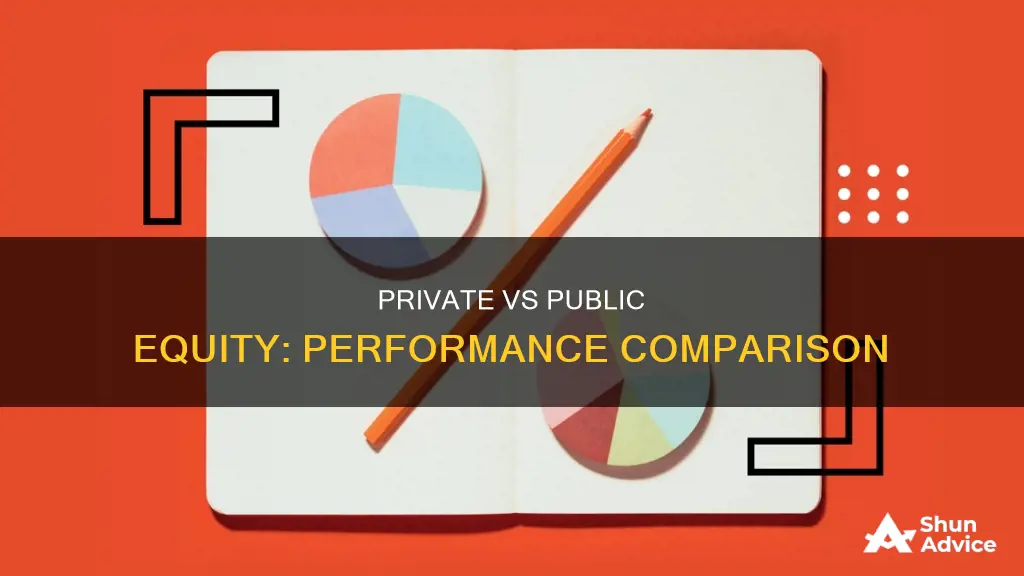
Private equity and public equity are two different ways for companies to raise capital and attract investors. Private equity refers to ownership in a private company, which is often done through private equity funds that cater to high-net-worth investors. On the other hand, public equity refers to ownership in publicly traded companies, which are available to anyone with an investment account. Private equity has historically offered higher returns but is not accessible to everyone and comes with higher risk, higher fees, and lower liquidity. Public equity, on the other hand, is widely known, highly liquid, and accessible to most investors.
| Characteristics | Values |
|---|---|
| Returns | Private equity has historically higher returns, averaging 13.33% annually over the past 25 years, compared to 8.16% for public equity. However, private equity returns can be lower for funds started when there are large inflows of capital. |
| Liquidity | Private equity is less liquid than public equity, with investments often tied up for many years. |
| Risk | Private equity is considered a high-risk investment, particularly due to its focus on startups. |
| Fees | Private equity funds tend to have higher fees than public equity investments. |
| Investor Type | Private equity is generally only available to accredited, high-net-worth investors, while public equity is available to anyone with an investment account. |
| Investor Involvement | Private equity investors may have a say in strategy, depending on their stake in the company. Public equity investors are typically passive owners. |
| Information Disclosure | Private companies are not subject to the same disclosure requirements as public companies, which must publish regular financial reports. |
| Company Stage | Private equity typically invests in companies in the early growth stage, while public equity is more common for established companies. |
What You'll Learn
- Private equity has historically higher returns but is high-risk and illiquid
- Public equity is widely known and highly liquid, making it viable for most investors
- Private equity investors are generally paid through distributions, not stock accumulation
- Public equity is safer and more readily available to investors
- Private equity is geared towards sophisticated investors, whereas public equity is available to anyone with an investment account

Private equity has historically higher returns but is high-risk and illiquid
Private equity has historically delivered higher returns than public equity, but it is a high-risk and illiquid investment option.
Private equity refers to ownership in a private company, often through private equity funds that cater to high-net-worth investors. These funds pool investors' money and then invest it in private companies, often with a long-term focus. Private equity funds are generally only open to accredited investors, who must meet certain minimum requirements for net worth. As such, private equity isn't available to everyone.
Data from Cambridge Associates shows that private equity has consistently outperformed stocks over the past 25 years. During the 25-year period ending December 31, 2022, private equity saw an average annual return of 13.33%, compared to an average return of 8.16% for the Russell 3000, an index of the 3,000 largest U.S. public companies.
However, private equity is considered a high-risk investment. While there is a chance of getting a higher return than the stock market, there is also a greater chance of losing money, given that private equity often invests in startups. Private equity funds also tend to have high fees, which can reduce returns.
Additionally, private equity funds are highly illiquid. When investing in these funds, investors often commit their money for many years before they can expect a return. This results in an opportunity cost, as investors miss out on the returns they could have made elsewhere during that time.
In contrast, public equity refers to ownership in publicly traded companies, which are available to anyone with an investment account. Public equity is widely known and highly liquid, making it a viable option for most investors. Publicly traded stocks can be bought and sold easily through public market exchanges, providing higher liquidity.
Public equity investments are generally considered safer than private equity and are more readily available to all types of investors. They are also subject to more oversight and regulation, reducing risk.
CTAs: Equity Investment Strategies and Performance
You may want to see also

Public equity is widely known and highly liquid, making it viable for most investors
Public equity is widely known and highly liquid, making it a viable option for most investors. It refers to ownership in publicly traded companies available to anyone with an investment account. It is listed on stock exchanges such as the New York Stock Exchange and the Nasdaq. Anyone can invest in public equity by opening a brokerage account and buying shares in individual companies or through mutual funds and exchange-traded funds (ETFs). Publicly traded stocks are available and easily traded daily through public market exchanges, providing higher liquidity. This means that public equity investments can be converted to cash with little notice, in contrast to private equity, which can have time horizons of a decade.
Public equity is also subject to more oversight and regulation. Public companies are regulated by the Securities and Exchange Commission (SEC) and are required to file regular financial reports and other documents. This provides greater transparency and lower risk for investors, especially when investing in a well-diversified portfolio. Public equity investments also tend to have lower fees than private equity.
While public equity is more accessible and liquid, private equity has historically offered higher returns. Data from Cambridge Associates shows that private equity has outperformed stocks over the past 25 years, with an average annual return of 13.33% compared to 8.16% for the Russell 3000 index. However, private equity is considered a high-risk investment, particularly due to its focus on startups, and it comes with higher fees and lower liquidity.
Overall, public equity's wide accessibility, high liquidity, and lower risk make it a more viable option for a broader range of investors.
Managers Investing in Negative NPV Projects: Strategic Risk-Taking
You may want to see also

Private equity investors are generally paid through distributions, not stock accumulation
Private equity investments are generally considered to be riskier than public equity investments, but they also have the potential for higher returns. Private equity investments are not publicly traded, and are therefore often less liquid and more difficult to access. Private equity funds tend to focus on long-term investments, and usually require high minimum investments.
Private equity funds are managed by partners who aim to generate favourable returns for shareholders. The funds are usually structured with an investment horizon of four to seven years, and the managers are incentivised by performance fees. The fees associated with private equity funds are often high, and can include management fees, performance fees, and transactional fees.
Private equity firms have access to multiple revenue streams, but there are only a few ways that they actually make money. These include management fees, carried interest, and dividend recapitalisations. Management fees are typically charged annually at a rate of around 2% of committed capital. Carried interest and performance fees are designed to incentivise senior-level professionals and align the interests of fund managers and investors. Performance fees can reach upwards of 20% of an investment's revenue. Dividend recapitalisations are a riskier strategy, where a private equity firm takes on new debt in a portfolio company to raise money to distribute a special dividend to investors.
Saving and Investing: Strategies for Future Financial Goals
You may want to see also

Public equity is safer and more readily available to investors
Public equity is widely known and highly liquid, making it a viable option for most investors. It is traded on public market exchanges, such as the New York Stock Exchange and the Nasdaq, and can be bought and sold at any time. This liquidity is a significant advantage, providing investors with the flexibility to turn their investments into cash with little notice. In contrast, private equity investments typically have longer time horizons, often committing investors' money for many years.
Public equity investments are generally considered lower risk. They are subject to more oversight and regulation, including requirements to file regular financial reports, providing greater transparency and protection for investors. Publicly traded companies are regulated by entities like the Securities and Exchange Commission (SEC) and must comply with laws such as the Sarbanes-Oxley anti-fraud legislation. This regulatory framework adds a layer of protection for investors, reducing the likelihood of fraud or financial mismanagement.
Additionally, public equity investments often have lower fees associated with them. While trading fees may apply when buying or selling stocks, these are becoming less common. Investors in public equity funds typically pay an annual expense ratio, which tends to be lower than the fees associated with private equity funds.
The accessibility and lower risk profile of public equity make it a more inclusive investment option. Anyone can open a brokerage account and purchase shares in individual companies or invest in mutual funds and exchange-traded funds (ETFs) to gain exposure to a diverse range of companies. This ease of access makes public equity a common component of retirement plans, such as 401(k)s, where individuals can build their investment portfolios over time.
Profitable Indian Franchises: Low-Investment, High-Profit Options
You may want to see also

Private equity is geared towards sophisticated investors, whereas public equity is available to anyone with an investment account
Private equity and public equity are two different ways for companies to raise capital and attract investors. Private equity refers to ownership in a private company, often through private equity funds that cater to high-net-worth investors. On the other hand, public equity refers to ownership in publicly traded companies, which are available to anyone with an investment account.
Private equity is geared towards sophisticated investors, often requiring accreditation and a certain level of net worth. These investors are typically labelled as accredited investors and include individuals with a specified net worth, income, or specific licenses, as well as institutions such as banks and pension funds. The private nature of these investments allows for fewer restrictions and investment guidelines from regulators. Private equity investors often have a say in strategy, with their influence depending on the size of their stake.
In contrast, public equity is widely known and highly liquid, making it accessible to most types of investors. Anyone can invest in public equity by opening a brokerage account and buying shares in individual companies or through mutual funds and exchange-traded funds (ETFs). Publicly traded stocks are available for trading daily through public market exchanges, providing higher liquidity compared to private equity.
While private equity offers the potential for higher returns, it also comes with higher risks, fees, and lower liquidity. Private equity funds often focus on long-term investments, with investors committing their capital for many years. Public equity investments, on the other hand, are generally considered safer and more readily available to all types of investors.
Unlocking Loan Options with Your Investment Portfolio
You may want to see also
Frequently asked questions
Private equity refers to an investment in a private company, usually through private equity funds that pool money from high-net-worth investors. Private companies are those that are not publicly traded on a stock exchange.
Public equity refers to ownership in publicly traded companies, which are available to anyone with an investment account. Public equity is also known as publicly traded stocks.
Private equity has historically provided higher returns than public equity. However, it is not available to everyone and has higher risk, higher fees, and lower liquidity. Private equity funds also tend to have high investment minimums.
Public equity is widely known, highly liquid, and available to most types of investors. It is also subject to more regulation and oversight, making it a lower-risk investment option.
Private equity has consistently outperformed public equity over the last 25 years. Data shows that private equity funds have generated higher average annual returns than public equities. However, private equity is considered a high-risk investment option, particularly as it often involves investing in startups.







